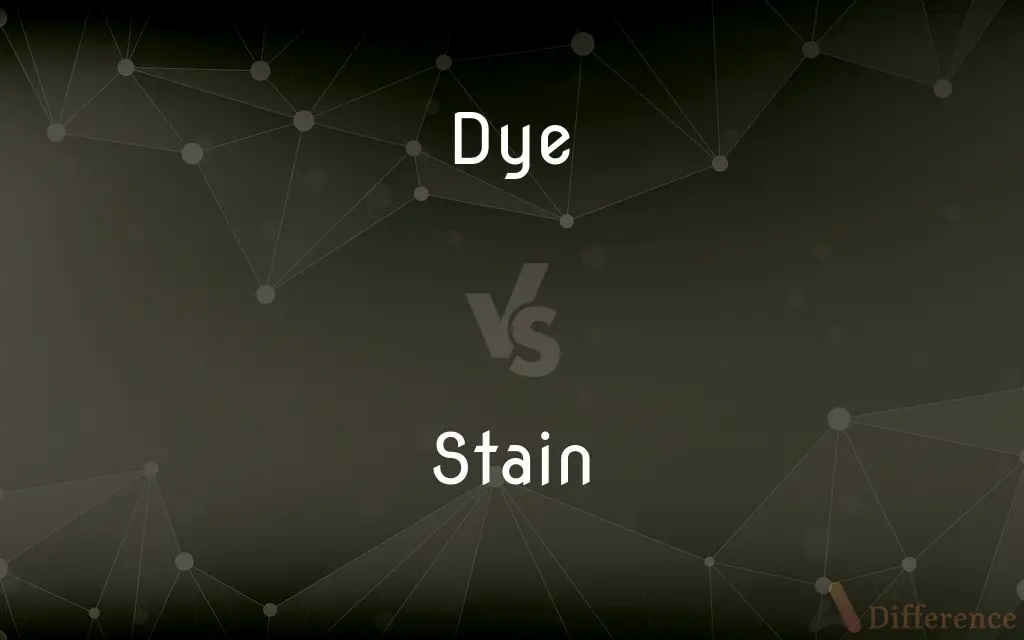Dye vs. Stain — What's the Difference?
By Tayyaba Rehman — Updated on October 25, 2023
Dye is a substance used intentionally to change the color of materials, while Stain is often an unintended mark or discoloration. Both interact with surfaces but serve different purposes.

Difference Between Dye and Stain
Table of Contents
ADVERTISEMENT
Key Differences
Dye and Stain are both agents that can impart color to a surface, but they do so with differing intents and outcomes. A dye is primarily used with the purpose of uniformly changing the color of an item, often for aesthetic reasons. For instance, fabrics are dyed to give them a particular hue or shade. Stain, on the other hand, usually refers to an undesired discoloration on a surface, often resulting from spills or other accidents.
In some contexts, the word Stain can have a positive connotation. For instance, wood is often stained to enhance its natural grain while also providing protection. This kind of staining is deliberate and aims to both beautify and protect the material. Conversely, Dye in such contexts might not provide any protective advantage, focusing solely on imparting color.
There are instances, however, when the distinction between Dye and Stain blurs. For example, in the realm of biology, cells and tissues are often "stained" with dyes to enhance visibility under a microscope. Here, the intention isn't to mark them undesirably but to highlight certain features using the coloring properties of the dye.
Another significant difference lies in the permanence and penetration of the two. Dyes are often designed to be permanent and penetrate deep into the material. Stains, especially the unintended ones, might just be superficial marks that can be removed with proper cleaning, although some can be stubborn and permanent.
Comparison Chart
Basic Definition
A substance used to change color of materials intentionally
An unintended mark or discoloration on a surface
ADVERTISEMENT
Intention
Deliberate
Often accidental, but can be deliberate (e.g., wood staining)
Permanence
Designed to be long-lasting
Can be temporary or permanent
Depth of Penetration
Penetrates deeply into materials
Might be superficial or penetrate deeply
Grammatical Role
Commonly a noun, but can be a verb ("to dye")
Commonly a noun, but can be a verb ("to stain")
Compare with Definitions
Dye
A solution containing colorant molecules.
The dye spread evenly throughout the solution.
Stain
A liquid used to color wood.
He used a dark stain to enhance the wood's grain.
Dye
An agent that imparts a new, desired hue.
The red dye gave the dress a vibrant look.
Stain
An undesired mark left on fabric or surface.
There's a stain on your shirt from lunch.
Dye
A natural or synthetic substance used to color materials.
She used a blue dye to color her fabric.
Stain
A substance used to highlight features in microscopy.
The biologist applied the stain to the slide.
Dye
A coloring matter in liquid form.
Be careful with that bottle; it's full of dye.
Stain
A moral blemish or tarnish.
His actions left a stain on his reputation.
Dye
A dye is a colored substance that chemically bonds to the substrate to which it is being applied. This distinguishes dyes from pigments which do not chemically bind to the material they color.
Stain
A stain is a discoloration that can be clearly distinguished from the surface, material, or medium it is found upon. They are caused by the chemical or physical interaction of two dissimilar materials.
Dye
A natural or synthetic substance used to add a colour to or change the colour of something
Blonde hair dye
A black dye
Stain
To discolor, soil, or spot
The spilled juice stained the carpet.
Dye
Add a colour to or change the colour of (something) by soaking it in a solution impregnated with a dye
I dyed my hair blonde
Stain
To bring into disrepute; taint or tarnish
The scandal stained the mayor's reputation.
Dye
A substance used to color materials. Also called dyestuff.
Stain
To change the color of (a piece of wood, for example) by applying a stain.
Dye
A color imparted by dyeing.
Stain
To treat (a specimen for the microscope) with a reagent or dye in order to identify cell or tissue structures or microorganisms.
Dye
To color (a material), especially by soaking in a coloring solution.
Stain
To produce or receive discolorations
Upholstery that stains easily.
Dye
To take on or impart color.
Stain
A discolored or soiled spot or smudge
A stain that was difficult to scrub out.
Dye
A colourant, especially one that has an affinity to the substrate to which it is applied.
Stain
A diminishment of one's moral character or good reputation by being associated with something disgraceful.
Dye
Any hue, color, or blee.
Stain
A liquid substance applied especially to wood that penetrates the surface and imparts a rich color.
Dye
(transitive) To colour with dye, or as if with dye.
You look different. Have you had your hair dyed?
Stain
A reagent or dye used for staining microscopic specimens.
Dye
To stain; to color; to give a new and permanent color to, as by the application of dyestuffs.
Cloth to be dyed of divers colors.
The soul is dyed by its thoughts.
Stain
A discoloured spot or area.
Dye
Color produced by dyeing.
Stain
A blemish on one's character or reputation.
Dye
Material used for dyeing; a dyestuff.
Stain
A substance used to soak into a surface and colour it.
Dye
Same as Die, a lot.
Stain
A reagent or dye used to stain microscope specimens so as to make some structures visible.
Dye
A usually soluble substance for staining or coloring e.g. fabrics or hair
Stain
(heraldry) Any of a number of non-standard tinctures used in modern heraldry.
Dye
Color with dye;
Please dye these shoes
Stain
(transitive) To discolour.
To stain the hand with dye
Armour stained with blood
Dye
A process of adding color to materials.
She wanted to dye her hair blonde.
Stain
To taint or tarnish someone's character or reputation
Stain
To coat a surface with a stain
To stain wood with acids, coloured washes, paint rubbed in, etc.
The stained glass used for church windows
Stain
(intransitive) To become stained; to take a stain.
Stain
To treat (a microscopic specimen) with a dye, especially one that dyes specific features
Stain
To cause to seem inferior or soiled by comparison.
Stain
To discolor by the application of foreign matter; to make foul; to spot; as, to stain the hand with dye; armor stained with blood.
Stain
To color, as wood, glass, paper, cloth, or the like, by processes affecting, chemically or otherwise, the material itself; to tinge with a color or colors combining with, or penetrating, the substance; to dye; as, to stain wood with acids, colored washes, paint rubbed in, etc.; to stain glass.
Stain
To spot with guilt or infamy; to bring reproach on; to blot; to soil; to tarnish.
Of honor void,Of innocence, of faith, of purity,Our wonted ornaments now soiled and stained.
Stain
To cause to seem inferior or soiled by comparison.
She stains the ripest virgins of her age.
That did all other beasts in beauty stain.
Stain
To give or receive a stain; to grow dim.
Stain
A discoloration by foreign matter; a spot; as, a stain on a garment or cloth.
Stain
A natural spot of a color different from the gound.
Swift trouts, diversified with crimson stains.
Stain
Taint of guilt; tarnish; disgrace; reproach.
Nor death itself can wholly wash their stains.
Our opinion . . . is, I trust, without any blemish or stain of heresy.
Stain
Cause of reproach; shame.
Stain
A tincture; a tinge.
You have some stain of soldier in you.
Stain
A soiled or discolored appearance;
The wine left a dark stain
Stain
(microscopy) a dye or other coloring material that is used in microscopy to make structures visible
Stain
The state of being covered with unclean things
Stain
A symbol of disgrace or infamy;
And the Lord set a mark upon Cain
Stain
An act that brings discredit to the person who does it;
He made a huge blot on his copybook
Stain
Color with a liquid dye or tint;
Stain this table a beautiful walnut color
People knew how to stain glass a beautiful blue in the middle ages
Stain
Produce or leave stains;
Red wine stains the table cloth
Stain
Make dirty or spotty, as by exposure to air; also used metaphorically;
The silver was tarnished by the long exposure to the air
Her reputation was sullied after the affair with a married man
Stain
Color for microscopic study;
The laboratory worker dyed the specimen
Stain
A mark or discoloration that's hard to remove.
The wine left a stain on the carpet.
Common Curiosities
What's harder to remove, Dye or Stain?
It depends on the type and source, but unintended stains can sometimes be easier to remove than dyes.
Can fabrics be stained intentionally?
Yes, sometimes fabrics are "stained" for a vintage or weathered look.
Are all Stains unwanted?
Not always. Some stains, like wood stains, are used deliberately for a desired effect.
Is Dye always used intentionally?
Typically yes, dyes are used to intentionally color materials.
Can one material both be dyed and stained?
Yes, a material can be dyed intentionally and later receive an unintended stain.
Can Dye be removed?
Dyes are often permanent, but some can be removed or faded with treatments.
Is staining wood the same as painting it?
No, staining enhances the grain and colors the wood, while painting covers the grain with opaque color.
Can dyes be natural?
Yes, there are many natural dyes derived from plants, animals, and minerals.
Can you dye over a stain?
It depends on the material and the nature of the stain, but sometimes dye can cover or blend a stain.
Can Dye be used in labs?
Yes, dyes are often used to stain tissues and cells in labs to make certain structures visible.
Are all stains bad for materials?
Not necessarily. Some stains, like wood stains, can protect the material.
Do dyes and stains affect all materials the same way?
No, the effect can vary based on material type, dye or stain composition, and application method.
Are dyes safe for skin?
Some dyes are skin-safe, but others might cause irritations or allergic reactions.
Is there a difference between hair dye and stain?
Yes, hair dye is meant to color hair uniformly, while a stain on hair is an unintended mark.
Is staining always a physical action?
No, "stain" can also refer metaphorically to a tarnish in reputation.
Share Your Discovery

Previous Comparison
Practised vs. Practiced
Next Comparison
Custard vs. PieAuthor Spotlight
Written by
Tayyaba RehmanTayyaba Rehman is a distinguished writer, currently serving as a primary contributor to askdifference.com. As a researcher in semantics and etymology, Tayyaba's passion for the complexity of languages and their distinctions has found a perfect home on the platform. Tayyaba delves into the intricacies of language, distinguishing between commonly confused words and phrases, thereby providing clarity for readers worldwide.
















































